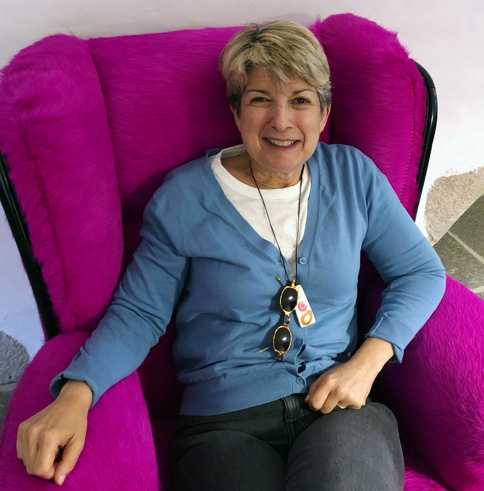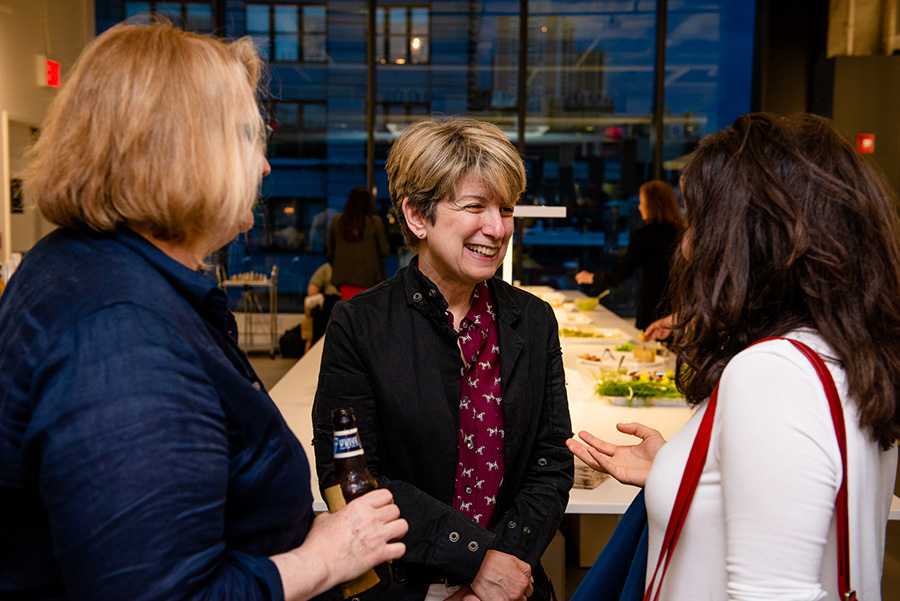SPOTLIGHT STORIES: LISA GOLDMAN
Interview conducted by Tracey Miller-Zarneke
Lisa Goldman has been a key figure in Women in Animation for decades, having served our East Coast community as a President of the New York City chapter in between her professional work as a content creator, story editor and producer. Lisa’s talents cover everything from conceptual development to drafting pitch bibles, writing scripts, and delivering comedy for animated children’s media across all platforms, and she has also channeled her love of food and worldly adventures into co-founding a culinary travel company called Tour de Forks.
WIA is grateful for Lisa’s years of service and is pleased to share this look into her history and perspective with our members.
Think back to the earliest moment in your life when you realized you loved being a creator of art and please share it with us.
My grandmother was an amazing storyteller. To me, she was magical. I spent a lot of time with her growing up. Grandma truly inspired my love for storytelling. It’s no wonder that I wound up creating content for kids and families.
I also probably watched way too many cartoons and sitcoms growing up. So when I started making up stories, it was like watching cartoons in my head and they were funny. My curse is that I can’t draw to save my life, so words are my weapons. I am such a fan of animators, character designers, illustrators and anyone who can draw. I love how they bring characters/stories to life.
Did your parents/family encourage you in your pursuit of art as a career? If so, how? If not, how did you move forward in your pursuit?
I was very quiet about my wanting to be a writer, actually a comedy writer. My parents didn’t know for a long time because it took me a long time to share that aspiration. My mom and dad both had a great sense of humor. From them, I learned that humor is such an important survival tool. I also watched a lot of television that most kids didn’t watch: my parents thought it was funny that I was the only three year-old watching Johnny Carson with my Mom every night. They also took me to see comedians in nightclubs, so I guess one can say they were quite helpful in my pursuit of comedy. I really liked women comedians when I was young, and they continue to inspire me now.
Who were/are your mentors, inside or outside of animation? How have they affected you?
In addition to my grandmother, my mother was also very creative and she inspired me, too. And have I said, women comedians? That list is a long one. Inside the animation world, I have been lucky to be inspired by many great women and men through Women In Animation. Tops is Jinko Gotoh, who has become a dear friend. In every aspect of what she does, she’s creative, determined and loyal. She’s also a great problem-solver. My former boss, Kristin Martin, has been a wonderful mentor and taught me about producing and developing shows. She liked my diverse background and encouraged me to be a producer. Fred Seibert has been a longtime mentor, he has taught me so much about this industry of ours and how to navigate it. I have been lucky to be partnered with Heather Kenyon on an animated preschool property that we sold to Mattel. Heather is incredible. She’s so well-connected and for good reason, she’s so good at what she does…producing, development, writing and deal-making. I learn a lot from her. I am thankful for the special people I’ve come to know in this business — women and men! Community is a beautiful thing.
Have you ever served as a mentor? If so, how has being on that side of the equation helped you?)
I have been a mentor on several fronts: as the lead of WIA NYC, as a teacher/coach independently, as adjunct faculty and hoping to be so with NYC’s first Animation Industry Council.
I love connecting people, so the role as lead of WIA NYC was a good fit for me and a great start on the mentoring path. I always tried my best to give everyone ACCESS to each other — those in positions to hire talent and/or buy shows with WIA NYC talent. This happened at meetings, networking mixers and beyond.
Debra Solomon has said that my energy has powered many artists, that I’m in touch with the morphing of the animation industry and I know what kids want…and I suppose the show I just sold is proof that such work can help me as well. What’s always been the best part about WIA is its members. I am always so blown away by how generous everyone is with their time and talent and availability to help others. Now that the official mentor programs are starting in NYC, it will be very exciting.
I teach a class both independently and for schools on how to create animated series and pitch bibles. Fred Seibert has been very supportive with my doing this work independently. I love helping people/companies create shows, so I also consult and doctor bibles and scripts, too. A by-product of this process is helping creators find or become more confident with their creative voice. It’s an honor to be on that journey with people. I taught a similar class for SVA. Presently at Montclair State, I teach a class called Business Practices for Illustrators/Animators. In all these classes, I became aware of how hard it is for students (and even for those further along on their career paths) to say their names out loud and what they do or want to do.,,and it appears that women seem to be worse at it then men. It takes practice. Eventually you own your voice and what you do. It’s about putting your intention out there. Classes and WIA are great places to practice networking.
When I was appointed to NYC’s first Animation Industry Council, it was and is truly an honor. This council is brand-spanking-new with only one meeting under our belts. Our purpose is to help guide a city-funded program called The Animation Project (TAP) that targets at-risk youth in New York City schools, nurturing their social, emotional and cognitive growth using digital art technology as a therapeutic medium and a workforce development tool. Many excel in this program when they’re not able to anyplace else in school. TAP’s tagline says it all…TRANSFORMATION THROUGH TECHNOLOGY! I visited the TAP studio and fell in love with everyone there–the interns and the therapists, teachers and administrators who run the program. We had the founder of TAP and some of the female interns speak at a WIA NYC meeting. We also invited other groups like ASIFA EAST and Children’s Media Association to attend. The more people who fall in love with TAP the better! And everyone did, it was one of those magic meetings. TAP needs speakers and studios to invite their interns to visit, shadow and/or work. They also need people to help interns develop the soft skills necessary to be successful in the workplace, etc. so if anyone reading this wants to help in these ways, please reach out to Brian Austin at [email protected]. So that’s who The Council is helping. I can’t wait for more Council meetings.
Why is an organization like Women in Animation important?
For so many reasons, WIA is important. One is because of the community it creates. The networking, advocacy, education and scholarship opportunities are amazing, and now with the official mentoring program, that makes what’s great even better.
I have always loved the community created with the WIA NYC chapter. I have made many lifelong friends at WIA and that’s special. And as WIA grows its chapters, it’s super to know that you can be traveling or moving to a new city where you can jump into a WIA meeting within the USA or internationally.
WIA gives you access to people in the business that you wouldn’t have on your own, and it gives you a point of contact if you do want to reach out. The job posts at WIA are fabulous. It keeps getting more and more exciting and I think the mothership has been doing an incredible job!
How has the status of women in our industry or female characters shifted over the course of your career? How has this affected your career path, if at all?
Since I started, I have seen more preschool shows develop strong, diverse female lead characters. It’s taken a while for my own show with a female lead to find its time, and this past December, Mattel bought it. Selling this show took twelve years. I felt it was important to keep fighting for this show because I really believe that preschool television has to be both a mirror and a window.
I’d love to see companies have writing rooms with diversity on all fronts as well as the story editors, directors and producers.
I would like to see the Writer’s Guild cover animation writers. This is a complex issue that deserves a solution.
What, if any, adversities have you faced in your career or life in general, and how did they shape the leader you are today?
In my career, the biggest challenges have come in selling shows. I always get close enough to keep going so I do.
I think life always brings challenges, whether big or small, and that’s why having support systems and community are so important. For me, it’s Melissa (my partner in life), my friends and family, and WIA. A strong sense of humor has also helped me to get me through it all. The biggest challenge I’ve ever faced was when my parents were sick and dying (at the same time). Afterwards I always felt that if I could get through that, I could get through anything. These kinds of times put everything into perspective.
Everything that’s happened in my career and life has made me more empathetic to others and their struggles/needs. It’s taught me to keep going and to help others keep going. Our business can be tough at times.
Share with us a moment of exhilaration in your career.
I’ve learned to break things down to smaller moments and to celebrate everything positive that happens along the way. This way there’s more. It’s a lonnnnngggg process in our business. My favorite moment is getting that “new idea” and if I love it enough, it fuels me to get it into a pitch-able form. I love that magic and rare “pitch” meeting where it all just works. Heather Kenyon and I had one of those most recently with Christopher Keenan at Mattel. I am really looking forward to the moment where the show gets produced and airs on some lucky broadcaster.
I also love meeting people who you really connect with. And when someone you’re helping makes it past a challenge. All so sweet!
What advice do you have for young people looking at animation or other artistic industries as their career field?
You’re lucky to pursue a career doing what you love. And it’s not just what you do, it’s who you are, so it will never be just a job. So network, network, network! It’s all about building relationships with people in this business, and I bet my students are tired of me telling them this. Of course, I try to get as many as I can to WIA… and not just because I like it, but because WIA delivers.
Make a special effort to keep yourself inspired.
What do you believe will encourage women to enter the creative field and seek to become leaders such industry?
Everything starts with an opportunity…whether it’s your first job or 50th. I think it’s a good time in our industry now, with lots of opportunity.
I think WIA does a great job at spotlighting women so you can learn about women doing amazing things and their careers. That’s inspiring!
Hopefully as women grow as professionals, they’re also growing as leaders.
I hope everyone finds that boss who loves pushing others forward. You never forget “that great” boss who turns you into a “professional.”
How do you keep your artistic spirit refreshed, even when under the pressure of production deadlines or life challenges?
I’ve learned to really trust my creative process and believe that it will come through for me even when “the me in me” is doubtful. I never lose my sense of humor and never give up. I meditate and that helps, too.
Any other thoughts or advice you wish to share with our membership?
Never Give Up!
WIA appreciates Lisa’s “Never Give Up” mantra, and the fact that her actions speak as loudly as her words. We wish her continued success in her animation endeavors, and beyond!


